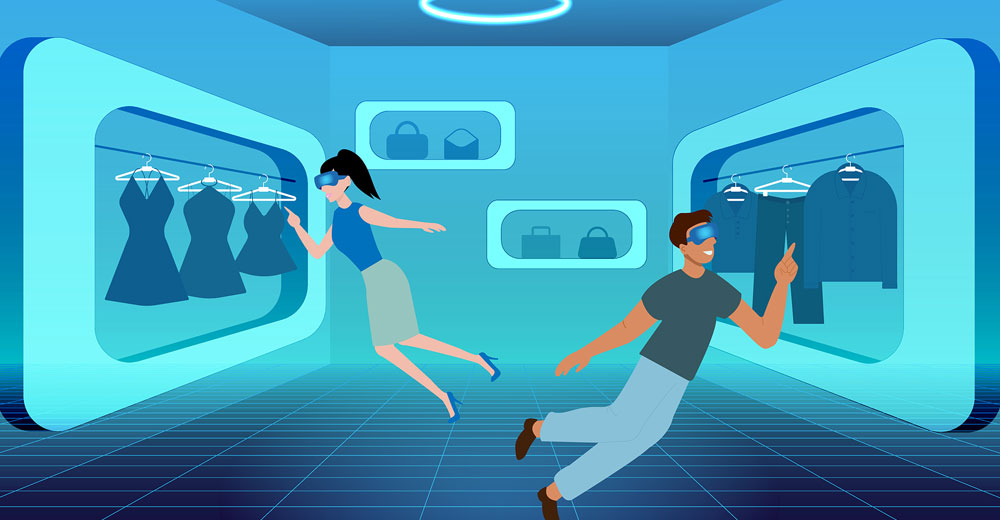The rise of the metaverse has been a hot topic in the tech world lately. This futuristic concept of a shared virtual space where people can interact and engage with each other has been gaining popularity and is expected to transform many industries, including e-commerce. And while the metaverse still needs to evolve to reach its high-concept vision, its current implementations have already started to drive changes to user/clients’ interactions with businesses and brands.
E-commerce, which once managed to transform how we shop, is now going through a transformation itself. Real-life experiences move to digital, offering a previously unknown level of immersiveness and interactiveness, and the metaverse is an ultimate manifestation of these changes.
So what impact will the metaverse have on e-commerce, and why should e-commerce brands consider partnering up with a reliable metaverse development company now? Let’s figure it out in this article.
What Is the Metaverse?
The metaverse is a term used to describe a hypothetical future version of the internet that is more immersive, interactive, and interconnected than what we currently have. It is a virtual space where people can interact with each other and digital objects in real time, using advanced technologies such as virtual/augmented reality and artificial intelligence.
In the metaverse, users can create their own avatars, explore virtual worlds, attend events, participate in games, and engage in social activities with other users from around the globe. It is a convergence of virtual and physical reality that blurs the lines between the two and provides endless possibilities for communication, entertainment, and commerce.
How Can Metaverse Revolutionize E-Commerce?
One of the potential benefits of the metaverse for e-commerce businesses is that it can provide a more seamless shopping experience. In traditional e-commerce platforms, users have to navigate through multiple pages, click on different links, and wait for pages to load. This can lead to frustration that may deter users from making a purchase. In the metaverse, however, users can browse through products in a 3D environment, interact with them, and purchase them without leaving the virtual space. This can create a more seamless and enjoyable shopping experience that can increase customer satisfaction and engagement.
At the same time, the metaverse can also change the way e-commerce businesses market their products, as brands can create virtual experiences that showcase their products in a more interactive and engaging way. For example, a fashion brand can create a virtual fashion show where users can see their latest collection of virtual models. A furniture brand can create a virtual showroom where users can see how their products look in different settings. These virtual experiences can create a more memorable and impactful brand impression, as well as break physical borders that have previously limited the audience’s reach and engagement capacities.
Virtual try-ons are other interesting opportunities delivered by the metaverse for e-commerce businesses. They allow users to virtually try on products, such as clothing or makeup. Users can create a virtual representation of themselves and then see how different products look and feel on their virtual avatar. This can copy the real-life experience and can help users make more informed purchasing decisions while also reducing the likelihood of returns or dissatisfaction.
Personalized recommendations can be delivered through Metaverse by leveraging user data and behavior to provide tailored recommendations for products or services. Using machine learning and AI algorithms, businesses can analyze a user’s interaction with products in the metaverse, e.g., after their visit to virtual showrooms, to understand their preferences and needs. Based on this data, businesses can provide targeted product recommendations that are more likely to interest the user. This can increase the likelihood of conversions and improve customer loyalty.
The metaverse can also provide opportunities for social commerce. Within the metaverse worlds, users can shop with their friends, get their opinions on products, and even purchase products together without the need to travel to a physical showroom or shop. In this case, besides bringing innovation to mundane things like shopping, the metaverse promotes inclusiveness and helps people with limited mobility engage with stores, products, and brands’ employees in full.
In Conclusion
The metaverse is a rapidly evolving technology that has the potential to innovate e-commerce in many ways. From creating a more seamless shopping experience to providing personalized recommendations, the metaverse can enhance the way businesses interact with their customers and create new opportunities for engagement and commerce.
With the increasing popularity and development of the metaverse, it is clear that e-commerce brands cannot afford to ignore this emerging technology. By exploring the metaverse capabilities and adopting the latest innovations like AR or VR, e-commerce brands can stay ahead of the curve and provide their customers with innovative solutions that meet their evolving needs and expectations.
